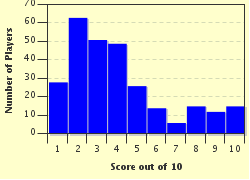Quiz Answer Key and Fun Facts
1. What is the meaning of the British place name 'Nottingham'?
2. What is the original name of Bristol?
3. The slang word 'carsey' for toilet originated in the army and is common in Britain and Australia. But which language did it come from originally?
4. Where in Britain would you find the town meaning 'Camp on breast-shaped hill'?
5. What is the meaning of the London suburb name 'Neasden'?
6. The obsolete airline 'Dan-Air' was short for what?
7. What is the literal meaning of the bread 'Pumpernickel' when translated from German?
8. We've all heard people talking poppycock, but do you know what it means literally?
9. What is the meaning of the Lancashire town Ramsbottom?
10. Finally one for Americans. The top seats (as in height) in a stadium are called 'The bleachers', but why?
Source: Author
satguru
This quiz was reviewed by FunTrivia editor
stuthehistoryguy before going online.
Any errors found in FunTrivia content are routinely corrected through our feedback system.

